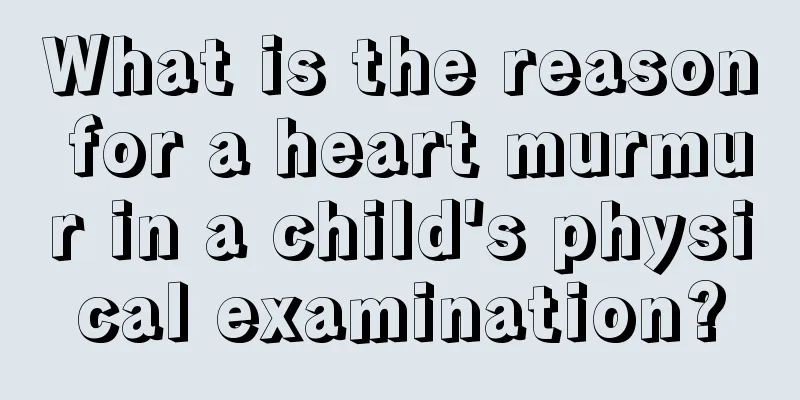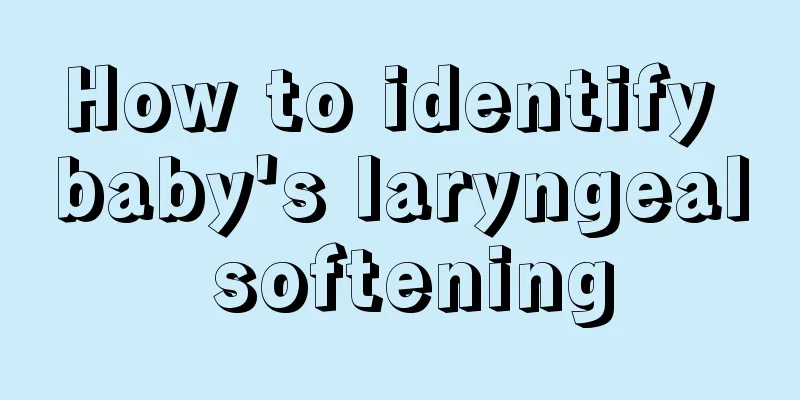What is the reason for a heart murmur in a child's physical examination?

|
Children's physical examination is a common examination in life. Regular physical examinations for children can not only keep track of their physical health at any time, but also prevent physical diseases. Heart murmurs in children during physical examinations are also a very common physical disease. There are many reasons for children's heart murmurs, which are generally caused by congenital heart disease. What is the reason for a heart murmur in a child's physical examination? Causes of a heart murmur in children Medically, heart murmurs in children are divided into physiological murmurs (also known as harmless murmurs or benign murmurs) and pathological murmurs. Physiological murmurs Physiological murmurs are more common in children. Medical data show that 23%-60% of healthy children can hear this murmur at the left edge of the sternum or the apex of the heart. Newborns, infants and school-age children may have mild grade I-II systolic murmurs, which are softer in nature, like the "fu-fu" sound of blowing wind, and some are musical. The production of this murmur is related to the child's vigorous metabolism, strong myocardial contraction and rapid blood circulation. It usually disappears at the age of 12-13. The child will not feel any discomfort and his activities will not be affected. Doctors and X-rays, electrocardiograms, echocardiograms and other examinations showed no evidence of heart disease. This physiological murmur is often discovered by chance, such as during a physical examination or when there is other illness. Therefore, the presence of a physiological murmur does not mean that you have a heart disease and does not require treatment. Pathological murmur Pathological murmurs are caused by pathological changes in the heart's blood vessels (including congenital and acquired). This type of heart murmur is generally rough and has a loudness of Grade III or above. The sick child may experience shortness of breath, weakness and other discomforts when moving. Common heart diseases include congenital heart disease, rheumatic heart disease, and infective endocarditis. However, sometimes physiological murmurs can occasionally reach grade III, which is difficult to distinguish from murmurs caused by congenital heart disease and rheumatic heart disease, and further examinations are necessary. In recent years, with the development of echocardiography, especially the application of color Doppler echocardiography, it is generally possible to identify whether the nature of a child's heart murmur is physiological or pathological, and to understand the causes of physiological murmurs. Parents should take their children to the hospital for further detailed examinations to determine whether the murmur is a physiological or pathological murmur so that the right treatment can be prescribed. Based on the principle of early detection and early treatment, the younger the child, the better the treatment effect will be. |
<<: What is the reason for the baby's lung noise when coughing?
>>: How useful is early childhood education for children?
Recommend
Can losing weight help you grow taller?
For some obese children or teenagers, they often ...
What are the massage techniques for babies with fever?
A baby is a fragile little life and can be easily...
Five ways to develop children's interpersonal skills
Parents can help their children develop interpers...
Nutritious breakfast for primary school students_Nutritious breakfast recipes for primary school students
I believe many people know that children, especia...
What should I do if my child wets the bed at night?
Enuresis mainly occurs in children. There are two...
How many hours a day does a four-month-old baby usually sleep?
Every mother wants her newborn to get enough slee...
What should I do if my child has blisters on his hands and it itches?
Children's skin is very delicate and can be e...
Five month old baby not gaining weight
Growth and development is one of the basic charac...
Congenital heart disease rescue methods for children
The probability of children developing congenital...
Treatment of chronic anemia in children
No matter who you are, if you suffer from a certa...
What should I do if my child with cerebral palsy drools?
Cerebral palsy is a relatively serious disease, a...
Baby is straining to poop
Some parents find that their babies have to exert...
Reasons for baby's sweaty hands and feet
The baby's physical health is one of the issu...
How to solve the problem of two-year-old baby not liking to drink milk powder
If your baby enters a stage where he doesn't ...
What should I do if my baby always coughs in the middle of the night?
We all know that taking care of a baby is a very ...









